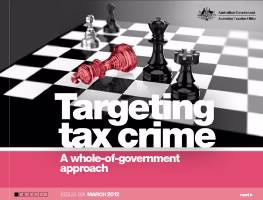Ray Finkelstein, QC, retired federal court judge, writing in the March 2012 edition of the Australian Tax Office publication “Targeting tax crime: A whole-of-government approach”, says:
“There is significant law breaking by persons from the middle classes. When these people commit crimes they are seen to be, and are, treated differently. This is especially true in the case of ‘white collar crime’ …. If the distinction between the two kinds of crimes is removed this would reduce the problems resulting from inconsistencies in sentencing”.
Mr Finkelstein’s article, titled “Crime and punishment: White collar crime vs true crime”, is reprinted below. In the article he takes issue with judges who have a rationale in sentencing white collar criminals that is different from that which they employ in sentencing ‘true’ criminals, and suggests that it may be necessary to relax some features of criminal law for the purposes of combating white collar crime.
The original article is available at http://www.ato.gov.au/content/downloads/snc00313370.pdf
“Crime and punishment: White collar crime vs true crime”
by The Honourable Ray Finkelstein, QC:
“There is a longstanding myth, slowly being eroded, that criminal behaviour is largely committed by those in a lower socio economic class.
The studies I have seen that address this define ‘true crimes’ as those that (1) directly harm or violate the rights of others or (2) constitute inherently immoral activity. When it comes to the punishment of true crimes, a court considers a blend of just desserts, reformation and crime control: rehabilitation, retribution, deterrence, incapacitation (prison) and restitution.
In the world in which we live it should be evident that it is wrong to assume that criminal behaviour is confined to lower socio economic class. There is significant law breaking by persons from the middle classes. When these people commit crimes they are seen to be, and are, treated differently. This is especially true in the case of ‘white collar crime’.
Here I refer to crimes committed by people of high social status in the course of their occupation. One thing that stands out about white collar crime is that it is not due to poverty and the like. Also the ‘cost’ of white collar crime is probably much higher than true crime. Compare a bank robber who steals $25,000 from a neighbourhood bank with the corporate manager who steals $2 billion from his company.
How do judges punish white collar crimes? As a general rule the judge’s rationale in sentencing is different from sentencing true criminals. General deterrence – that is deterring others in similar positions from engaging in like behaviour – is usually the sole guiding principle. Retribution seems to have little role to play. Most judges believe that the humiliation, loss of job and loss of status experienced by white collar criminals when they are apprehended, brought to trial and punished, is usually sufficient punishment.
There are, of course, some white collar crimes where an element of punishment cannot be avoided. This is usually confined to crimes that involve a breach of public trust, a serious effect on the market, or a very large fraud loss.
What is interesting is that even though deterrence is the primary goal – imprisonment, when available, is regarded as a last resort. Probably the reason is a belief that imprisonment has a far greater detrimental effect on a white collar criminal. In some cases the judge will take into account the accused’s ability to make restitution as a factor that eliminates the need for a prison sentence.
This approach to sentencing inevitably leads the public to the conclusion that there is a law for the rich and a law for the poor. The problem that leads to this perception is what I see to be a tension between the aim of general deterrence (which usually requires a harsh penalty – often imprisonment if it is available) and the particular (personal) attributes of white collar criminals.
When resolving this conflict, judges tend to compromise – they impose weekend sentences, short sentences or suspended sentences. I do not agree with this approach. It is, I think, necessary for white collar crimes, especially those that involve violations of trust, market manipulation, share market manipulation, anti-trust violations and the like to be regarded in the same way as other fraudulent conduct such as false pretences, or obtaining money by deception. They should be regarded in the same way because they are of a similar character. That is to say, most (I do not say all) white collar crimes are not really different from true crimes.
If the distinction between the two kinds of crimes is removed this would reduce the problems resulting from inconsistencies in sentencing.
A more difficult issue is whether it is necessary to relax some features of criminal law for the purposes of combating white collar crime. The fight against white collar crime is an immense task and regulatory authorities have limited resources. Establishing a guilty mind at trial is always difficult and sometimes impossible. The courts’ narrow approach to construction of statutes often defeats parliament’s true intention. The difficulty of obtaining independent (for example, documentary) evidence is well known. All this inhibits the proper pursuit of white collar crime.
The courts do not possess power to overcome all these difficulties. Parliamentary intervention is necessary in some areas; but courts do have an essential role to play.
In the first place when acting as a court of construction the court could adopt a pragmatic approach to the definition of crimes. Second, as a court of construction the court could limit those crimes in which the prosecutor must establish a guilty mind. Finally, perhaps there may be some crimes where the courts can state that the standard of proof should be lower than ‘beyond reasonable doubt’ and suggest that parliament should bring about the necessary change.
The most likely contenders are those statutes which have introduced civil penalties for contraventions that are also criminal. Parliament has already decided that a lower standard of proof is in order for these offences, provided there is a lower penalty. In substance, all that is needed is for parliament to legislate for an appropriately higher penalty for those offences.”
http://www.ato.gov.au/content/downloads/snc00313370.pdf
END

